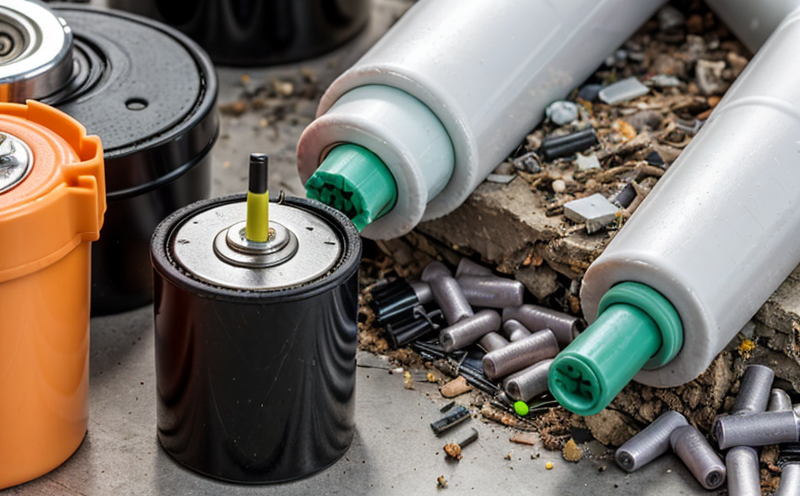JIS C8708 Recycling Testing of Automotive Lead-Acid Batteries
The JIS C8708 standard provides a comprehensive framework for the recycling and end-of-life testing of automotive lead-acid batteries. This service is crucial for ensuring that batteries are processed in an environmentally responsible manner, meeting stringent quality standards while adhering to international regulations.
Automotive lead-acid batteries play a pivotal role in modern transportation systems, providing essential power for starting vehicles, powering accessories, and storing energy during peak usage periods. As these batteries reach the end of their useful life, it is imperative that they are recycled properly to recover valuable materials such as lead, sulfuric acid, and plastic.
According to JIS C8708, recycling processes must ensure minimal environmental impact by minimizing the release of harmful substances into the environment. The standard covers various aspects including the disassembly process, material recovery methods, and final product quality checks. It also emphasizes the importance of traceability throughout the entire lifecycle of these batteries.
The testing protocol outlined in JIS C8708 includes several key components designed to assess both the efficiency and environmental impact of recycling processes:
- Material Recovery Efficiency: Ensuring that maximum possible quantities of valuable materials are recovered from discarded batteries.
- Emission Control: Monitoring and controlling emissions during all stages of processing to ensure compliance with local and international environmental laws.
- Product Quality Assurance: Guaranteeing that recycled products meet the same quality standards as new components, ensuring reliability in automotive applications.
- Traceability Systems: Implementing robust systems to track each batch of batteries from collection through final processing, enhancing accountability and compliance.
The testing procedures described in JIS C8708 are meticulously designed to address these critical areas. They involve rigorous laboratory analyses aimed at quantifying the amount of recoverable materials, assessing air quality during operation, validating product performance post-recycling, and verifying that all steps comply with established guidelines.
For organizations involved in automotive lead-acid battery recycling, adhering to JIS C8708 not only enhances operational efficiency but also strengthens their commitment to sustainable practices. By doing so, businesses can demonstrate leadership within the industry and build trust among stakeholders, including customers and regulatory bodies alike.
The implementation of this standard ensures that recycled automotive lead-acid batteries are safe for reuse in various applications, contributing significantly towards reducing waste and conserving natural resources. Compliance with JIS C8708 also helps companies navigate complex regulatory landscapes more effectively by providing a clear roadmap for achieving compliance requirements across different regions.
Overall, the JIS C8708 recycling testing service offers comprehensive support to industries dealing with end-of-life automotive lead-acid batteries. Our experienced team can assist you in understanding how best to integrate this standard into your existing processes, ensuring seamless integration while promoting sustainability and responsible business practices.
Benefits
- Enhanced Environmental Responsibility: By adhering to JIS C8708, companies can significantly reduce their carbon footprint by minimizing waste and reusing valuable resources.
- Improved Product Quality: The testing procedures ensure that recycled products meet the same stringent quality standards as new components, enhancing product reliability and customer satisfaction.
- Increased Efficiency: Streamlined processes and improved resource recovery rates contribute to operational efficiency, leading to cost savings for businesses.
- Better Compliance: Adherence to JIS C8708 helps organizations navigate complex regulatory environments more effectively, ensuring legal compliance without unnecessary delays.
- Enhanced Reputation: Demonstrating commitment to sustainability and responsible business practices through adherence to JIS C8708 can enhance a company's reputation among stakeholders and the public.
In summary, implementing the JIS C8708 recycling testing service offers numerous benefits that extend beyond mere compliance; it fosters innovation in sustainable technologies while promoting long-term viability for businesses operating within this sector.
Why Choose This Test
- Rigorous Standards: JIS C8708 sets strict guidelines that ensure the highest quality in recycled automotive lead-acid batteries.
- Expertise and Experience: Our team consists of highly skilled professionals who possess extensive knowledge about battery recycling processes.
- Comprehensive Support: From initial consultation to final certification, we provide full support throughout every stage of the testing process.
- Global Recognition: Compliance with JIS C8708 is widely accepted across numerous countries, providing international credibility for your business.
- Cost-Effective Solutions: While maintaining high standards, our services remain competitively priced, offering excellent value-for-money options.
Choosing the JIS C8708 recycling testing service means partnering with experts who understand both the technical aspects and broader implications of battery recycling. This ensures that you receive reliable results that contribute positively to your organization’s sustainability goals.
International Acceptance and Recognition
The JIS C8708 standard is recognized globally for its stringent requirements in automotive lead-acid battery recycling. This international acceptance underscores the importance of adhering to such standards, as they set a benchmark for environmental responsibility and product quality.
Many countries have adopted or are considering adopting similar regulations based on the principles established by JIS C8708. For instance, Japan has been at the forefront of developing these types of standards due to its leadership in environmental protection initiatives. By following this standard, businesses can anticipate smoother transitions into other markets that may adopt similar requirements.
The widespread adoption of JIS C8708 reflects a growing awareness about the need for sustainable practices across various industries. As more nations recognize the significance of reducing waste and conserving resources through proper recycling methods, adherence to such standards becomes increasingly important.
Organizations that comply with JIS C8708 not only meet current regulatory demands but also position themselves favorably for future developments in environmental regulations. They demonstrate their commitment to sustainability by showcasing how they contribute positively to global efforts aimed at preserving natural resources and reducing pollution levels.





